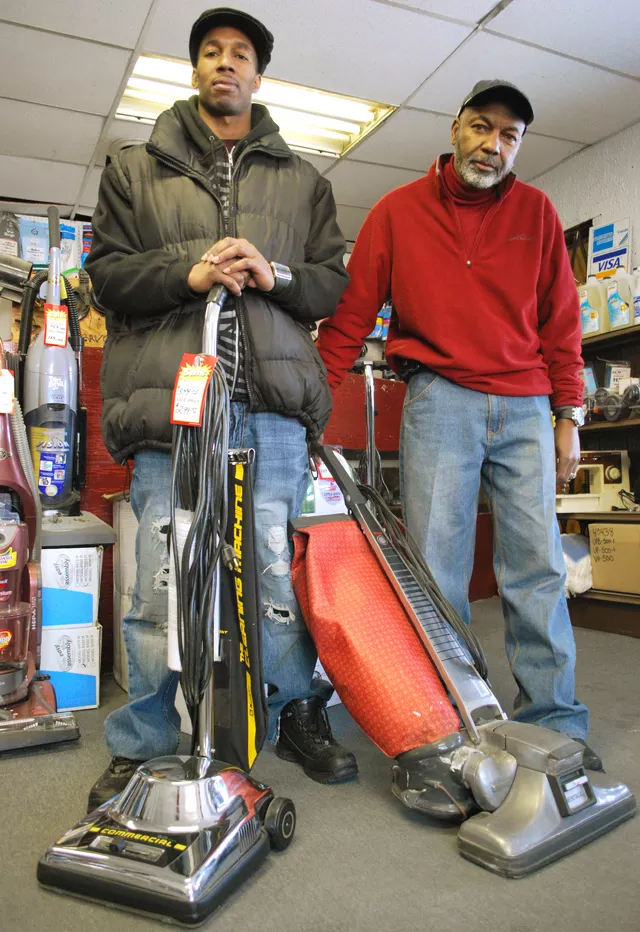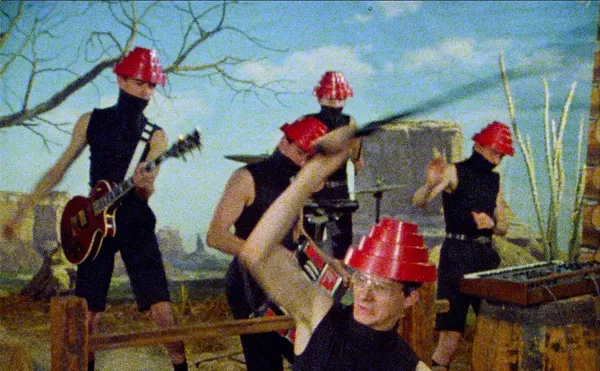Arthur Willis calls a customer into the workshop at the back of his store.
"See this?" he says, pointing inside the gears of an old vacuum cleaner. He's showing the man how to perform a minor repair himself for next time. "Tighten this down. There. Now put that belt on that roller." The lesson takes three minutes.
And — with that — he just got rid of some repeat business.
But that gesture, he figures, will bring that customer back for something else some other time. Because here at Bronson's Vacuum Cleaner Service Shop, on McNichols near Greenfield, everything is about helping the customers. It has to be.
"It's tough. Wal-Mart, Sears, I cannot compete with them," says Arthur, 56. "They can sell 'em cheaper, but they can't beat us in service, and that's the benefit of having a ma-and-pa business. Nobody can beat a ma-and-pa in service. They're going to give you the service because they want you back."
The shop belongs to him and his son, Artie, 35. Two longtime employees work here too. The place is a relic from the days before mega-stores, when a single small business could specialize in a single small item.
When he bought the place 25 years ago, it was another shot at having his own business, after his first one was essentially wiped out. But the store became devoted to bigger things.
"It's a selfish reason," Arthur says. "Just to be able to keep a business in Detroit and not sell out. Almost every black business in the city of Detroit is selling out or closing up. We have a tremendous problem with African-Americans in the city of Detroit patronizing African-Americans, and our dollars don't stay in the community at all. So our young kids can't get a job."
"What if I can have enough business that I can hire 10 of those kids? That means I got 10 kids off the street and I'm teaching them a trade. And that's the reason I keep it open, because I refuse to shut it down."
That's not the main reason though.
Arthur once had his own janitorial company. His wife ran a maid service.
Things went very well for a while. "We made a lot of money," he says. But he didn't pay all his taxes and it cost him. "You get involved with Uncle Sam in not paying the taxes and he has a way of bringing you down to the bottom," he says. The fines and back taxes ended the good life. Goodbye, Corvette. Goodbye, nice things.
"I was devastated," he says. "You go from having a nice income to no income. But I'm glad I went through it because it's why my faith is stronger. Really, it's not about how much money I make anymore. If I make a lot of money but I'm not happy with anything else, what's the purpose of having the money?"
After his fall, he started going to church more, took Bible studies classes, and became a pastor at a church in Romulus. He's also a volunteer chaplain for the Detroit Public Schools. When someone's kid gets shot at school or some other tragedy happens, he's the one who gets the call to come in and comfort the distraught.
Bronson's had been around for years when Arthur found it for sale and bought it. This would be his second chance.
"It never really was mine though," he says. "This was basically for the family and basically for my son."
All three of Arthur's other kids got college degrees. But Artie didn't want to. Since he was a kid he'd join his father at work, both at the janitorial company and at Bronson's, watching and learning. Arthur encouraged it. "Because he didn't go to college, I knew down the road that he's gonna need a place to work; he's gonna need this," he says.
Their shop is small. A few dozen vacuum cleaners circle the floor space along the walls and poke upward from shelves standing in the middle. Some are 50-year-old Hoovers and Kirbys, right next to newer, more elaborate models imported from China. It's like a museum of vacuum cleaner history.
In the old days, they made them heavy and durable, and they'd last for a decade or more. If it broke you got it repaired. Nowadays they're made of light plastic and break easily.
Bronson's survives because, in tough times, its customers will get their old vacuum cleaners fixed instead of buying a new one, and because, many of them say, the old models are simply better than today's.
"When archaeologists come back a thousand years from now they're still going to find a Kirby," Artie says. "You can burn it, beat it, but you can't break it. They made a model of a vacuum cleaner that actually withstood the test of time."
Most repairs are about $20. Or you can trade in your old vacuum for credit on a new one. Rebuilt vacuums sell as cheaply as $29. The vintage models are still popular with the older folks, who know from experience that they don't make them like they used to.
"This one here's probably 50, 60 years old," Artie says, going into showroom mode. He taps on one. "Everything's cast iron on here. You could go outside and vacuum up the concrete with this. I'm serious!"
He clearly knows his way around vacuums. He had no choice but to learn. This place would become his second chance too.
He was in his apartment about 10 years ago when some guys from the neighborhood broke in and robbed him. He chased them out, called the cops, filed a report. When the police left, the robbers showed up again, and a shoot-out ensued in the street.
A bullet hit Artie in the leg. He, in turn, shot and killed one of the men. That earned him six years in prison for voluntary manslaughter.
His father had given him the shop, and now had to come out of retirement to keep it alive until Artie got out. He'd need it more than ever after this, Arthur figured.
"Coming out of jail is gonna be tough for a young African-American to go find a job, 'cause when you get a record or something, it's tough to get a job anywhere, 'cause you get a stigma," Arthur says. "And you see that all over the city of Detroit. Very seldom are you going to make any big money doing anything, 'cause the first thing they're going to ask him is, 'Oh, you did time?' And I didn't want to have the streets be his life."
Artie says he got humbled in prison, sobered up, learned to appreciate the small treasures of a normal life. When he was released, he started a family, started attending church, started rebuilding a life. Now the shop is his again.
"We went in and came out successfully, and we're blessed to still have something to come home to," he says. He refers to himself as "we" when telling the story. So does his dad. They're so close they speak as if they served time together.
Artie tells the story as his young son plays a few feet away. He brings the boy to the shop, just to soak it all in, because he's already planning to pass the place down to him one day, just as his own father did.
When that day comes, it'll be another ring in the ripple a place like this creates. This store gives four people steady jobs. It saved a son from the streets. A young man will grow up and make it his. And a father learned that a family business brings more than money.
"Once you've been successful, and once you've lost it and God gives it back to you, it's easier now to live off a little," Arthur says. "You don't need as much as you think you did in the beginning, before you really know why you do what you do. Because before, I was just doing it. But this time around I know why I'm doing it. The value is there."







